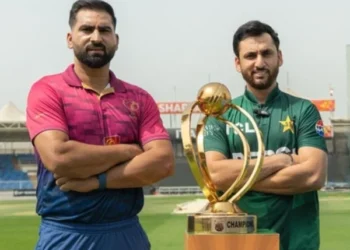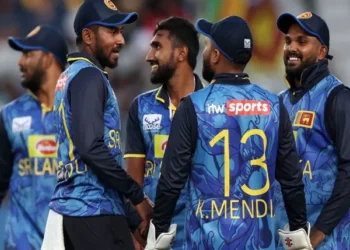Pakistan’s sporting fraternity has received a wave of excitement and pride as young squash talent Ashab Irfan secured a remarkable victory at the Jones Creek Open Squash Tournament in the United States. His victory not only earned him $12,000 in prize money but also marked a significant milestone in his blossoming career.
Facing off against Malaysian squash player Nathan Kewe, Ashab displayed resilience, mental toughness, and exceptional skill, turning the match around after losing the first game. With a final scoreline of 8-11, 11-2, 11-2, and 11-6, the Pakistani player sealed the championship in just 40 minutes.
This win is more than just an individual achievement — it reflects Pakistan’s legacy in squash, a sport where the nation once ruled the world for decades.
The Match Overview: A Game of Grit and Comeback
The final match was nothing short of a roller-coaster.
- First Game (8–11): Ashab Irfan began the match with visible nerves as his Malaysian opponent Nathan Kewe took early control. Kewe capitalized on small errors, keeping Ashab under pressure and securing the first set.
- Second Game (11–2): The loss lit a spark in Ashab. He came back stronger, displaying aggressive shot-making and superior court coverage. Dominating from the outset, he allowed Kewe only two points.
- Third Game (11–2): With momentum firmly on his side, Ashab once again outclassed his opponent. His precision and tactical gameplay left Kewe struggling.
- Fourth Game (11–6): In the final stretch, Ashab maintained his composure despite Kewe’s attempts at a comeback. With a mix of powerful drives and delicate drop shots, Ashab clinched the decisive game and with it, the championship title.
The win not only highlighted his technical ability but also showcased his mental strength and adaptability — essential qualities for excelling at international squash.
Who is Ashab Irfan? A Rising Star in Pakistani Squash
Ashab Irfan may not yet be a household name like Jahangir Khan or Jansher Khan, but victories such as this demonstrate that he is steadily climbing the ladder in professional squash.
- Early Career: Ashab has been active on the squash circuit, participating in junior and professional tournaments, steadily making a name for himself.
- Playing Style: Known for his endurance, tactical intelligence, and swift footwork, Ashab has the ability to wear down his opponents while capitalizing on their weaknesses.
- Future Potential: With consistent performances, he could break into higher-ranked tournaments and re-establish Pakistan’s prominence in the sport.
For Pakistan — a nation that has given the world some of the greatest squash players — nurturing talents like Ashab Irfan is crucial to regaining its lost dominance.
The Legacy of Pakistani Squash
To truly appreciate the significance of Ashab’s victory, one must understand Pakistan’s extraordinary history in squash.
Jahangir Khan: The Invincible
Jahangir Khan is arguably the greatest squash player in history. Between 1981 and 1986, he went on an unbeaten streak of 555 matches, a world record in any sport. His dominance inspired generations of players worldwide.
Jansher Khan: The Successor
Following Jahangir’s reign, Jansher Khan carried Pakistan’s flag, winning eight World Open titles and cementing the country’s dominance through the 1980s and 1990s.
The Decline
Despite this golden era, Pakistan witnessed a gradual decline in squash due to lack of infrastructure, limited sponsorship, and insufficient training facilities. By the 2000s, countries like Egypt, England, and Malaysia overtook Pakistan on the global stage.
The Hope for Revival
Players like Ashab Irfan now represent a new wave of hope. With better support, modern coaching, and exposure to international tournaments, Pakistan can once again rise in the global squash rankings.
The Significance of the Jones Creek Open Victory
Winning an international tournament like the Jones Creek Open carries multiple layers of importance:
- Recognition for Ashab Irfan: It boosts his international profile and ranking points.
- Inspiration for Young Players: Aspiring squash athletes in Pakistan now have a modern role model to look up to.
- National Pride: In a country passionate about sports, especially cricket, victories in other disciplines revive conversations around diversity in sporting excellence.
- Global Visibility: Such wins put Pakistan back on the global squash map, reminding the world of the country’s rich history in the sport.
Challenges for Pakistani Squash Players Abroad
While Ashab’s victory is commendable, it also highlights the challenges faced by Pakistani athletes in international competitions:
- Limited Funding: Many players have to self-finance their tours and participation in overseas events.
- Lack of Infrastructure: Pakistan’s squash facilities are not always up to par with international standards.
- Absence of Corporate Sponsorship: Unlike cricket, squash receives little financial support from big companies.
- Exposure Gap: Players often lack consistent exposure to the world’s top players, affecting their growth.
Despite these hurdles, victories like Ashab’s prove that talent, dedication, and resilience can overcome obstacles.
The Global Squash Landscape
The current squash scene is dominated by Egypt, home to stars like Ali Farag, Nour El Sherbini, and Mohamed ElShorbagy, who have revolutionized the sport with their aggressive, fast-paced gameplay.
Countries like England, Malaysia, and New Zealand also continue to produce world-class players.
Pakistan, though lagging, still has untapped potential. If players like Ashab Irfan are given the right platforms and support, Pakistan could reclaim its lost glory.
Quotes and Reactions
While official statements from Ashab Irfan may be limited, sports analysts and fans across Pakistan have celebrated the victory:
- Sports analysts highlighted his resilience after losing the first game, noting that such mental strength is rare in young athletes.
- Fans on social media congratulated him, calling the win a “ray of hope” for Pakistan squash.
- Former squash players urged authorities to provide Ashab and other rising stars with more facilities and international exposure.
The Way Forward: Reviving Squash in Pakistan
Ashab’s triumph should not remain an isolated achievement. To truly revive squash in Pakistan, a systematic approach is needed:
- Investment in Infrastructure: Modern training centers and squash courts must be built nationwide.
- Corporate Sponsorship: Private companies should sponsor promising players, covering their training and travel expenses.
- Grassroots Programs: Squash academies in schools and colleges can identify and train young talent.
- International Exposure: Regular participation in overseas tournaments helps players adapt to diverse playing styles.
- Government Support: Sports boards and ministries need to prioritize squash alongside cricket, hockey, and athletics.
With such measures, players like Ashab can flourish, and Pakistan can once again dominate global squash.
Conclusion
Ashab Irfan’s victory at the Jones Creek Open Squash Tournament is not just a personal milestone; it symbolizes Pakistan’s enduring connection with squash. By defeating Malaysian player Nathan Kewe after a tough start, Ashab showcased determination, adaptability, and the kind of skill that once made Pakistan a squash powerhouse.
While challenges remain, this victory is a beacon of hope — reminding fans and authorities alike that with the right investment and support, Pakistan can once again climb to the top of the squash world.
For now, Ashab Irfan’s win has reignited pride and optimism in Pakistani squash circles, inspiring young athletes to dream bigger and fight harder.

























